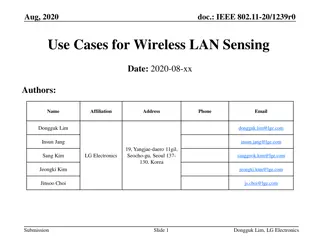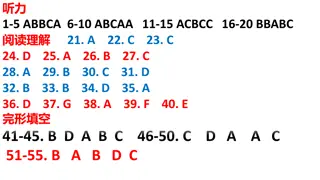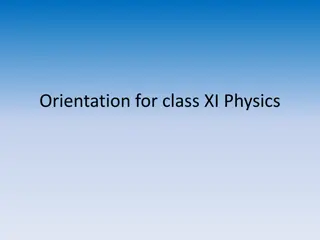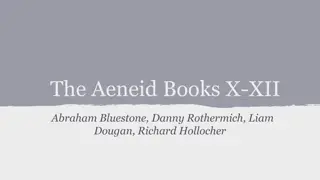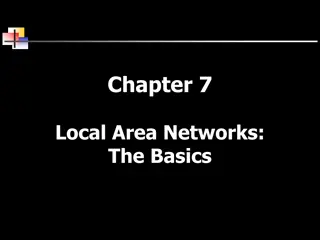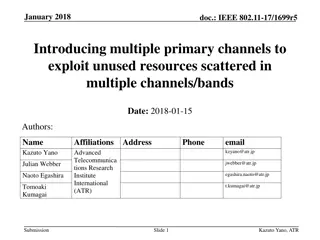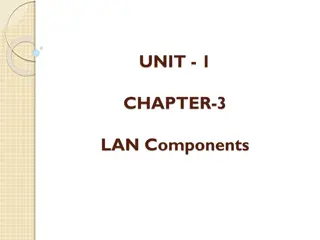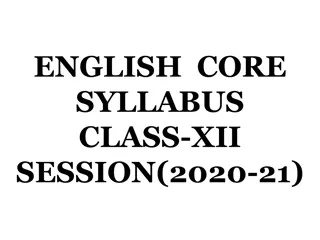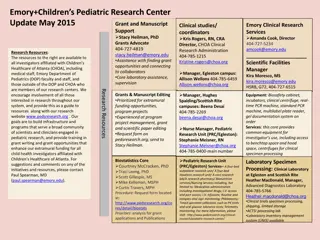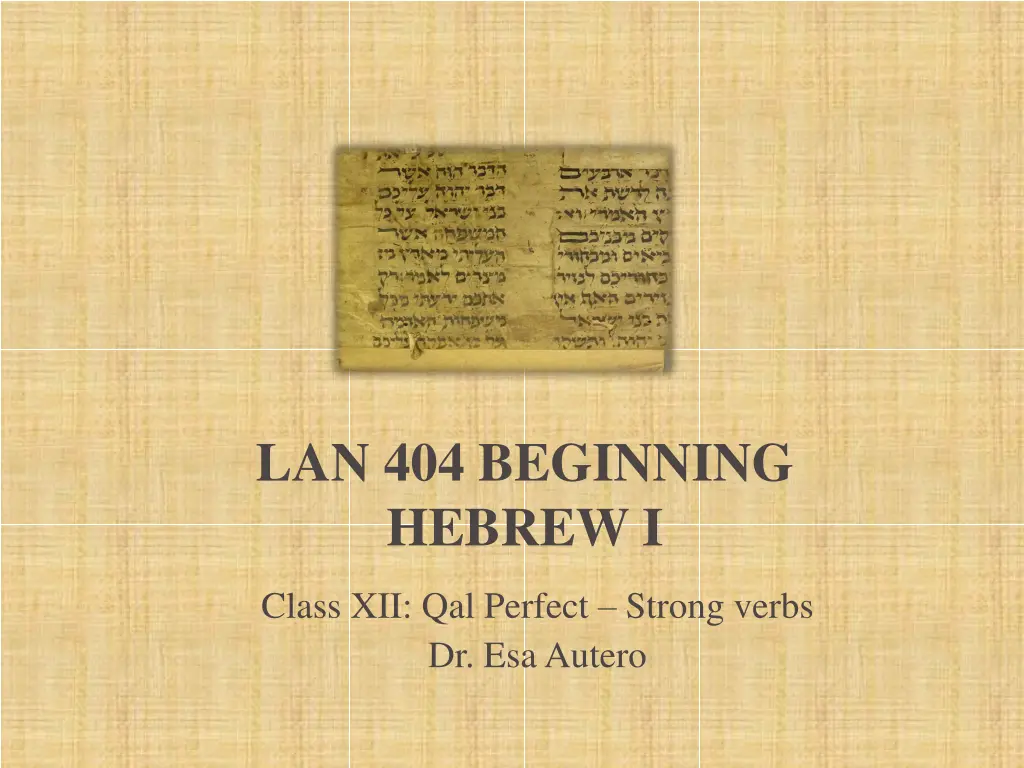
Hebrew Qal Perfect Strong Verbs Explained
Learn about Qal Perfect Strong verbs in Hebrew Class XII with Dr. Esa Autero, covering topics such as the Qal stem, types of verbs, translation of the Perfect conjugation, and sufformative forms. Understand different verb patterns and meanings in Qal stem verbs for a thorough grasp of Hebrew language basics.
Download Presentation

Please find below an Image/Link to download the presentation.
The content on the website is provided AS IS for your information and personal use only. It may not be sold, licensed, or shared on other websites without obtaining consent from the author. If you encounter any issues during the download, it is possible that the publisher has removed the file from their server.
You are allowed to download the files provided on this website for personal or commercial use, subject to the condition that they are used lawfully. All files are the property of their respective owners.
The content on the website is provided AS IS for your information and personal use only. It may not be sold, licensed, or shared on other websites without obtaining consent from the author.
E N D
Presentation Transcript
LAN 404 BEGINNING HEBREW I Class XII: Qal Perfect Strong verbs Dr. Esa Autero
Qal Perfect Strong verbs 1.1 Introduction App. 72,000 verbs in the Hebrew Bible 2/3 in Qal stem (50,699) First and most important of the seven stems Qal stem pattern needs to be memorized others build on that The Qal stem basics Active voice Simple or unnuanced action he killed
Qal Perfect Strong verbs The simple action of Qal divided into: 1) Transitive verbs Transitive verbs take a direct object The prophet wrote the book 2) Intransitive verbs Intransitive verbs don t take direct action He fasts twice a week 3) Stative verbs Stative verbs describe a state of being the priest is old In English state is indicated by using is + adjective In Hebrew state is indicated by stative verbs (to be heavy) (to be small)
Qal Perfect Strong verbs 1.1 Translation of the Perfect conjugation Perfect describes a completed action or state of being English translation: past tense (he studied); perfect (he has studied); past perfect (he had studied); future perfect (he will have studied) When describing a state of being: English present tense (he is wise); past tense (he was wise); or present tense with verbs of perception or attitude (he knows, he loves) Time concept is secondary and needs to be deduced from the context Perfect tense indicates completed action whether in the past, present or the future
Qal Perfect Strong verbs 1.2 Qal perfect strong verbs Sufformative - Perfect Translation He killed Inflectional endings or sufformatives of Qal paradigm 3ms 3fs She killed Note the endings - 2ms You killed Endings and specific vowel changes must be memorized! 2fs You killed 1cs I killed 3cp They killed Paradigm starts with 3ms lexical form 2mp You killed 2fp You killed 1cp We killed
Qal Perfect Strong verbs To dwell To remember To write To keep To gather 3ms The 3fs 2ms 2fs 1cs 3cp 2mp 2fp 1cp
Qal Perfect Strong verbs Roots ending in When a verbal root ends in , two identical consonants become one +Daghesh Forte = 2ms You cut 2fs You cut 1cs I cut 2mp You cut 2fp You cut
Qal Perfect Strong verbs Roots ending in When a verbal root ends in two identical consonants +Daghesh Forte. become one ) ( Same rule applies as becomes See esp. (to give) (I gave)
Qal Perfect Strong verbs Stative verbs (indicate state of being/condition) Classified per stem vowel (vowel associated w/ second root consonant) Pathach-stative To become great To be wise Tsere-stative to be heave To be old Holem-stative To be small To be able
Qal Perfect Strong verbs Pathach-stative Tsere-stative Holem-stative Strong verb 3ms Stative paradigms 2ms 2fs 1cs 3cp 3fs 2mp 2fp 1cp
Qal Perfect Strong verbs Stative verbs and the corresponding adjectives Stative verb Qal pf. 3ms Adjective masc. singular To be heavy Heavy To be full Full To be unclean Unclean To be hungry hungry What s the difference? None distinguish by looking at the inflection and the context
Qal Perfect Strong verbs 2.1 Two little but important words 1) The negative particle Perfect and imperfect verbs are negated w/ particle It is always place before the verb You did not observe the laws You did not remember the covenant
Qal Perfect Strong verbs 2) The particle The word (also and ) usually translated as behold . This is only one of its nuances it appears more than1000x in HB. May also take Type 1 pronominal suffixes / (a) The particle may be used to add emphasis E.g. And God saw all that he had made, and behold, (it was) very good (Gen 1:31)
Qal Perfect Strong verbs (b) to indicate immediate presence of someone or something w/ urgency And behold, I am with you (Gen 28:15) (c) to introduce a fact or situation on which subsequent statement id based ... And Samuel said to all of Israel, Behold, I have listened to all (1 Sam 12:1)
Hebrew Numbers Practice Workbook p. 67, no:1-5 p. 68, no: 1-5 Homework Workbook p. 69, no: 1-5 Bible Translation Practice letters and reading (out loud) e.g. words on vocabulary & workbook Vocabularyquiz (Ch. 13) on words pp. 148-49 (13.15)




